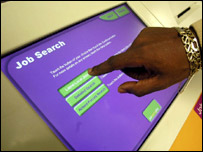
The new rules will focus on what tasks people are able to do
|
New incapacity benefit tests are to be introduced, which ministers say will mean fewer sick and disabled people will qualify for being unable to work.
Work and Pensions Secretary Peter Hain says the changes, introduced next year, will end "sick-note Britain".
But campaigners from the Disability Alliance say they have grave reservations about the consequences of bringing in a tougher test.
The new disability test could cut the number of annual claimants by 20,000.
The Department for Work and Pensions estimates that about 2.64 million people currently claim incapacity benefits.
The new work capability assessment, which will cover the entire UK, is being introduced alongside the employment support allowance - which will replace incapacity benefits for new claimants from next autumn.
Mr Hain said the true cost of people claiming incapacity benefit in 2006-07 was £12.5 billion.
At the moment more than 60% of the people who apply for incapacity benefits are successful, but only 50% of people who take the new test are likely to pass it.
Those who fail will be expected to seek work.
According to figures obtained by the Times newspaper under the Freedom of Information Act, some 250,000 people claim £600m in benefits for stress-related illness, while the 2,000 who are too obese to work claim £4.4m.
Mr Hain says the new system will place greater emphasis on what sick and disabled people can do, rather than what they cannot.
Tests such as being able to walk more than 400 metres (437 yards) or being able to climb 12 steps without the aid of a banister would be abolished.
The new test will look at other skills, such as a person's ability to use a computer keyboard or a mouse, because this type of task is likely to be needed in the workplace.
People seeking to claim disability benefits will be assessed according to various criteria such as their manual dexterity, speech, vision and hearing, as well as their ability to cope under pressure and interact with other people.
Mr Hain said: "We want to help people, not punish people. This is about giving people opportunities because you are better off in work - the evidence shows that."
Government 'spin'?
Danny Alexander, Liberal Democrat spokesman on work and pensions, accused the government of "spinning" the issue to compensate for its failure to create policies which successfully return disabled people to work.
He said: "There are millions of disabled people in this country who want to work, who would be able to work, if they were able to get the sort of personalised, detailed help that they need to help them manage their medical condition.
"This is not about helping people get back into work. This is about stopping people getting benefits. That is an entirely different part of the equation."
The Conservatives were also critical of the announcement by Mr Hain's department.
Shadow Work and Pensions Secretary, Chris Grayling said: "This is at least the fifth time the government has made this announcement, but the reality is that it is completely missing its targets on incapacity benefit.
"At the current rate of progress it will take them 25 years longer than planned to reach their target of getting one million off incapacity benefit."
'Another jab'
Disability groups have expressed concern about the new tests.
Neil Betteridge, head of the charity Arthritis Care, expressed concern that the new test will not take enough account of people whose conditions change from day to day.
And Sophie Corlett, policy director at mental health charity Mind, said there was a danger that those forced to return to work prematurely would see their health deteriorate, meaning that "their chances of working actually diminishes".
People who receive the benefit have also criticised the proposal.
Peter from Cardiff said: "This is another jab at disabled and sick people. Every time the government looks at its deficit, it seems that sick and disabled people are its target, no matter what government is in power at the time.


~RS~q~RS~~RS~z~RS~38~RS~)
Bookmark with:
What are these?